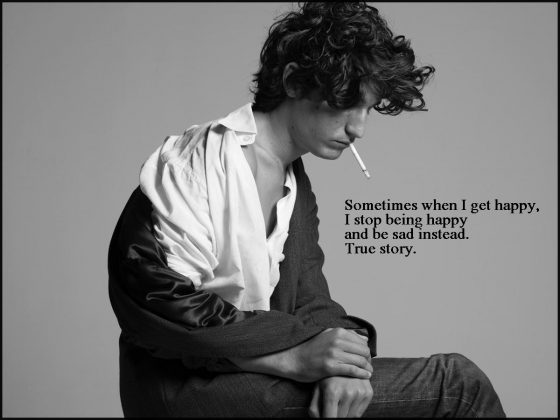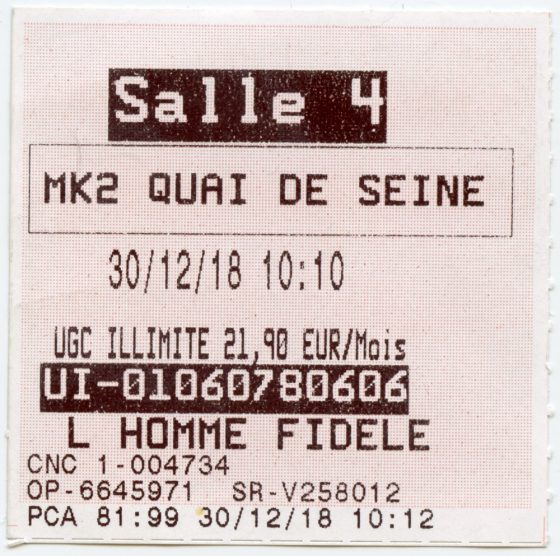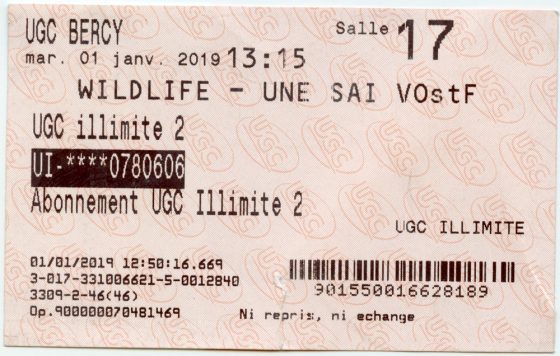L'homme Fidèle & Wildlife

Lack of family dynamic duo
Sometimes there are a lot of bad films in a row, as we had in 2018. In utterly objectively noting this, I may have come off as subjectively cranky, the amusing/horribly tragic aspect of Global Warming. If it is dire – and it fucking well is – you can’t say that, because then everyone will think you’re a nut. If all films this year actually suck, you can’t say, because no one will read you.
Yes, that’s why no one reads me.

Also yes, films sucking is equally horrible as all of us drowning just as we run out of oxygen in twenty years. It’s the kind of irony no longer seen…in films!


In selecting and praising the only other good film of 2018 – L’homme Fidèle. It was an opportunity to sound temporarily less like a crank than I am. Fortunately, I’m me (which can precede almost any sentence), because the best and only way to praise a good film is to badmouth an overpraised one – Wildlife.


L’homme Fidèle and Wildlife are identical films in nearly every way – bad spouse (Mme. Laetitia Casta & Mr. Jake Gyllenhaal), other bad spouse (M. Louis Garrel & Ms. Carey Mulligan), intervening child (M. Joseph Engel & Mr. Ed Oxenbould) and sexual interloper (Mme. Lily-Rose Depp & Mr. Bill Camp). Both written and directed by actors (M. Garrel & Mr. Paul Dano, with writing help from Ms. Zoe Kazan), and both films about affairs and marriages coming apart.
The latter is bland, literary (has that ever been a compliment?), stuffed with inconsistently motivated and unrelatable characters who were no doubt based on real people, and clunky fire metaphors no doubt based on some kind of tradition. Let’s call it ‘literary’.
The former is fun and full of difficult and deluded characters that are somehow extremely easy to relate to. I would like to thank Dorothée for liking the former enough to see it twice, being right, and making me see it. I’m right in acknowledging that she’s right. Just remember that, darling.
I would then, in my contrarian fashion, like to blame Dorothée for making me see the latter. Would like to, but in the case of Wildlife, there was just nothing else playing. We were doomed to see it. Doom as in fate that brings characters together instead of giving them choices. We’ll get to the kid in Wildlife…now!
Like many lessons unlearned by people unwilling to see bad films (i.e. see everything), the two films together are instructive about what works and could be, I dunno, instructed, side by side if there was a professor alive who could survive more than one Wildlife viewing. And someone unseen force causing him to see it. Without having any agency of any kind.
Both films (additionally) are told from the point of view of two characters. L’homme Fidèle (just looked that up, Dorothée, and apparently «fidèle» can also mean ‘loyal’, as in «supporteur/supportrice fidèle». Ah, French wordplay. Ah, non-native speakers lecturing native ones on wordplay) is told from the perspective of (what I now have learned is) famous bobo-meme-meat M. Garrel.

Credit where credit is due: http://garrelouvreuse.tumblr.com
I was not to find this out until later, but M. Garrel «est devenu le “Sad Keanu”» but with a more Saint-Germain has-it-all-but-is-still–super–bummed je ne sais huh. Playing the straight man, as he does to some effect:
In the film, M. Garrel is still in love eight years on with Mme. Casta, who broke up with him to have a child with the man she was having an affair with. We should think him an idiot for wanting to rekindle the romance, but the lack of apology, and the unhesitating speed with which he pursues her, hammers home the character’s foibles and so works in his favor. It is to M. Garrel’s great credit that he goes on to make Mme. Casta infidelity sympathetic in the same way: it’s just how she is.
Wildlife has a significant problem in its narrator Mr. Oxenbould, who has no discernible characteristics whatsoever. I’m guessing that this was an awful slog of a book, and the film is hardly an advertisement. But my ignorance could fool me that unformed adolescent insight was sprinkled preciously throughout.
Instead, Ms. Kazan and Mr. Dano make the brave decision to exclude the voiceover, no doubt following the advice of Mr. Syd Mead and not, say, Mr. Billy Wilder. But I’ll let Ms. Kazan drive that last nail in:
Kazan: the book is written like a memory piece – his main action is to observe.
A neutral, non-reactive observer. Why, just imagine the effect on the audience! Who, sitting impassively in a theater, are supposed to have a… something … watching a film.
It’s gross that his mom brings Mr. Oxenbould along to have an affair with Mr. Camp. Probably happened to the author. But, even here, at the climax, the character expresses no reaction. I would have preferred an opposite and weird and believable one to nothing.
In this, Mr. Oxenbould does not compare well to M. Engel, who is introduced to us saying that his father did not die of natural causes, but was murdered! It is the perfect conceit from a ten-year-old: just believable enough to be true, and just fantastic enough to make M. Garrel nervous and seem the fool.
Mr. Gyllenhaal’s and Ms. Mulligan’s behavior (running off to fight fire to preserve his masculinity and cheating on her husband in front of her son, respectively) is bland and unpleasant to be sure, but more importantly, it is unrelateable. It’s neither something that we could see ourselves doing, nor something the filmmakers are competent to make us feel. With the insensible observer, we are even robbed of the opportunity to feel how abusive this behavior might have been, or what it might have felt to experience it.
The Take – Wildlife

-$9.00
Balance is the crucial aspect of both films: M. Garrel able to constantly teeter that gap that makes up things funny, as Mr. Dano’s direction remains ‘good’. There is ‘acting’, and quality is signaled to give us the tiny rush of feeling that we are watching something important, but no strong sense of connection or god forbid, laughter.
Ah. That’s why literary sounds like an insult. Bit of stylistic advice for the next go round: try cranky. That’s why everyone reads me.
The Take – L’homme Fidèle

$9.00
The Lonely Comments Section

 [logo]
[logo]


